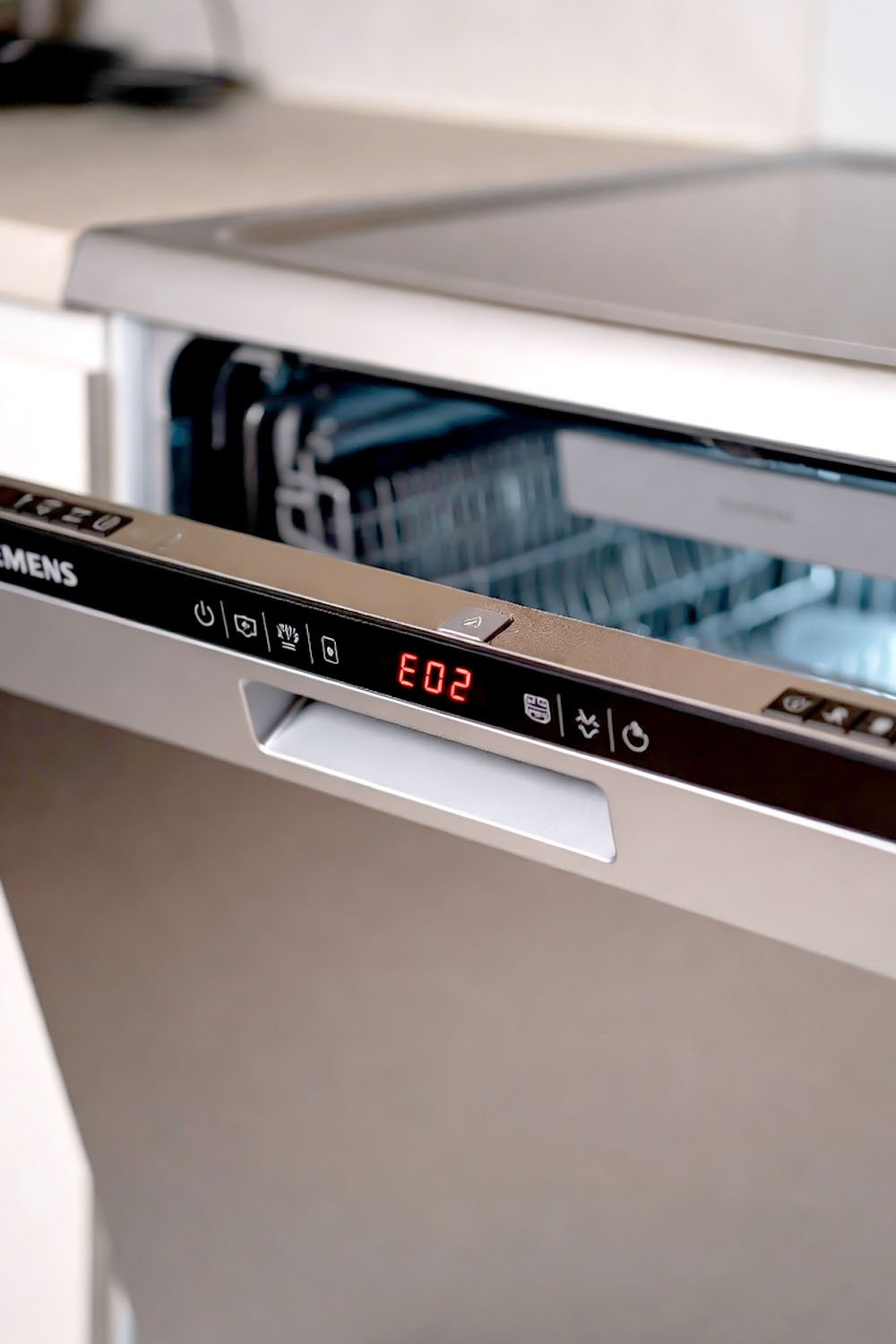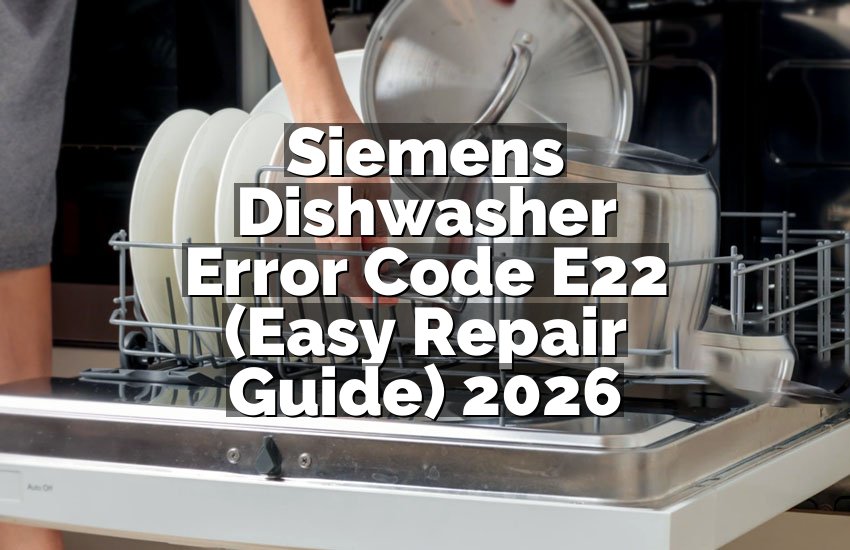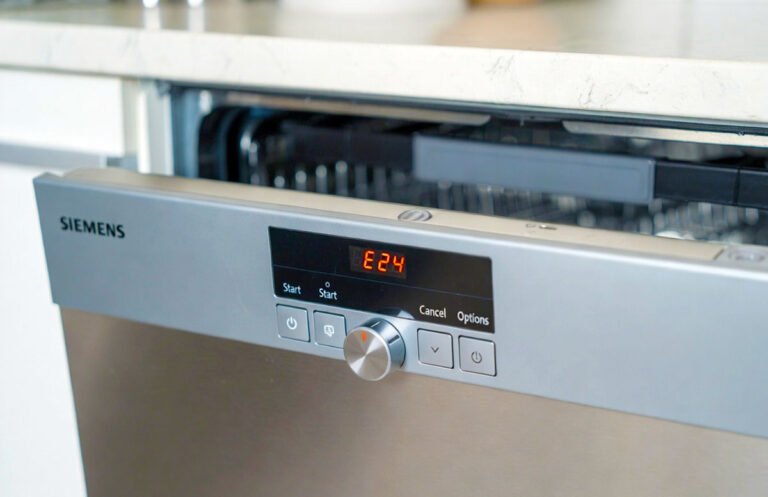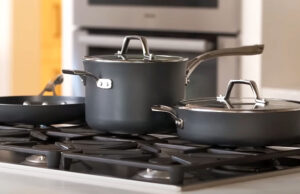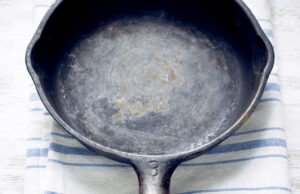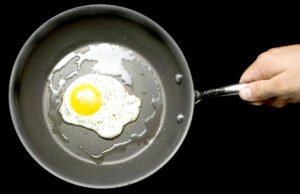As an Amazon Associate, I earn from qualifying purchases at no extra cost to you.
Beko Dishwasher Not Cleaning Properly? Fix It Fast Today!
Are you frustrated with your Beko dishwasher leaving your dishes dirty? It’s so annoying when you expect sparkling clean dishes but end up with food stains or grease. Don’t worry! In this article, we will uncover why your dishwasher is not cleaning properly and show simple ways to fix it quickly. From filters to sprays, we cover everything you need to know to get your dishwasher working like new again.
Why Your Beko Dishwasher Might Not Be Cleaning Properly
Check and Clean the Filters
One of the most common reasons a Beko dishwasher isn’t cleaning well is a dirty or clogged filter. The filter traps food particles and prevents them from recirculating, but if it gets too full, water cannot flow properly. First, open the dishwasher and remove the bottom rack. You will see the filter at the bottom; carefully twist it and pull it out.
Once removed, rinse it under warm running water. For stubborn particles, use a soft brush to scrub away residue. Make sure to check the mesh and the plastic parts for trapped debris. If the filter is damaged, replace it with an original Beko part. After cleaning, put the filter back securely and ensure it is locked in place, or your dishwasher might leak or fail to clean correctly.
A clean filter improves water circulation and ensures detergents can reach all dishes. Regularly cleaning the filter once a week or after heavy use keeps the dishwasher efficient. Remember, a small filter problem can lead to large cleaning issues, so don’t skip this simple check.
- Remove and rinse the filter under warm water
- Use a brush to remove stuck particles
- Inspect for damage and replace if needed
- Reinstall securely to prevent leaks
- Clean regularly to maintain performance
Inspect and Clean the Spray Arms
Another key reason your Beko dishwasher may leave dishes dirty is clogged spray arms. Spray arms push water around to clean dishes, and when blocked, they cannot reach every dish. First, remove the spray arms. Depending on your model, you may need to unscrew or simply pull them out.
Check all holes for food, mineral deposits, or soap buildup. Use a toothpick or soft brush to clear any blockages carefully. Rinse the spray arms thoroughly under running water. While cleaning, inspect the arms for cracks or wear, as damaged arms reduce cleaning efficiency.
After cleaning, reattach the spray arms properly. Run a short rinse cycle to check that water flows well. Clean spray arms once a month or more if you have hard water. Proper maintenance ensures that every dish gets water and detergent evenly.
- Remove the spray arms according to the model
- Check holes for debris or buildup
- Use a brush or toothpick to clear blockages
- Inspect for cracks and replace if needed
- Reattach and test water flow
Check the Water Supply
Sometimes, a dishwasher does not clean properly because it doesn’t get enough water. Make sure the water supply valve is fully open. Low water pressure or blocked pipes can reduce cleaning power. Check the inlet hose for kinks, bends, or clogs. If water is not flowing correctly, the dishwasher cannot spray or rinse dishes effectively.
Hard water can also leave mineral deposits inside the machine, affecting performance. Use a dishwasher-safe water softener or run a cleaning cycle with vinegar to remove buildup. Inspect the float switch, which controls water levels, to make sure it is not stuck. A stuck float switch can prevent the dishwasher from filling enough water, causing poor cleaning.
By ensuring proper water supply, you give your dishwasher the pressure it needs for strong cleaning. Water is the main ingredient for sparkling dishes, so don’t ignore this check.
- Ensure water supply valve is open
- Check inlet hose for kinks or blockages
- Remove mineral deposits using softeners or vinegar
- Inspect float switch for proper movement
- Maintain water supply for effective cleaning
Use the Right Detergent and Rinse Aid
Choosing the correct detergent and using rinse aid is crucial for clean dishes. Beko dishwashers work best with high-quality dishwasher tablets or powders. Avoid using regular dish soap, as it can cause foam and damage the dishwasher. Check that you are using the right amount based on your load size.
Rinse aid helps prevent water spots and improves drying. Without it, dishes may appear cloudy or greasy even if they are technically clean. Fill the rinse aid dispenser and adjust the settings if your water is very hard. Using both detergent and rinse aid correctly enhances cleaning performance and prevents residue on glasses and plates.
Regularly check your detergent drawer for buildup or blockages. Old detergent can clump and not dissolve properly. By keeping both detergent and rinse aid in optimal condition, your dishwasher will clean efficiently every time.
- Use Beko-approved detergent tablets or powder
- Avoid regular dish soap to prevent foam
- Fill and adjust rinse aid for spot-free dishes
- Clean detergent drawer regularly
- Use proper amounts for better performance
Load Dishes Correctly
Loading dishes incorrectly is another hidden reason for poor cleaning. Make sure plates, bowls, and pots do not block the spray arms. Avoid stacking items too tightly, as water cannot reach all surfaces. Place larger items at the sides or back, and small items in front to ensure proper spray coverage.
Bowls and cups should face downward so water can reach inside. Avoid blocking detergent dispenser with large utensils. Forks and knives should be placed with handles down to reduce shadowing on other dishes. Proper loading ensures every item gets cleaned evenly.
Sometimes, people overload their dishwasher thinking it saves time, but this reduces water circulation and cleaning efficiency. Learning the right arrangement takes a few tries but results in sparkling dishes every time.
- Avoid blocking spray arms with large items
- Place bowls and cups facing downward
- Keep utensils handles down
- Don’t overload the dishwasher
- Arrange dishes for even water coverage
Regular Maintenance and Cleaning Cycles
Even if everything seems fine, your dishwasher needs regular maintenance. Run a cleaning cycle at least once a month with dishwasher cleaner or vinegar. This removes grease, mineral deposits, and odors. Wipe the door seals, edges, and inside walls with a damp cloth.
Check the drain and remove any trapped debris. If you skip maintenance, buildup can reduce water flow, detergent effectiveness, and spray arm performance. Make a habit of inspecting the dishwasher monthly. A well-maintained dishwasher works more efficiently and lasts longer.
Remember, regular care is easier than expensive repairs. By keeping filters, arms, water, and detergent in check, you ensure perfect cleaning every time. Maintenance is a small effort for long-term benefits.
- Run monthly cleaning cycle with dishwasher cleaner or vinegar
- Wipe door seals, edges, and walls
- Check and clear the drain
- Inspect spray arms and filters monthly
- Maintain regularly for best results
Final Thoughts
Beko dishwasher not cleaning properly can be frustrating, but most problems have simple solutions. By checking filters, spray arms, water supply, detergent, dish loading, and regular maintenance, you can fix nearly all issues. Taking these steps ensures sparkling dishes and avoids costly repairs. Your dishwasher can work like new again with just small, consistent care and attention.
| Task | What to Do | Tools Needed | Frequency |
|---|---|---|---|
| Clean filters | Remove and rinse | Brush, warm water | Weekly |
| Spray arms | Remove, clean holes | Toothpick, brush | Monthly |
| Water supply | Check valve and hose | None | Monthly |
| Detergent & rinse aid | Use correct type & amount | Detergent, rinse aid | Every wash |
| Load dishes | Proper arrangement | None | Every wash |
| Maintenance cycle | Vinegar or cleaner | Dishwasher cleaner | Monthly |
Do Beko Dishwashers Require Special Detergent?
Yes, using the right detergent is essential. Beko dishwashers are designed to work with standard dishwasher tablets or powder. Regular dish soap creates foam, causing poor cleaning or leaks. Tablets are convenient, dissolve evenly, and help remove tough stains. Some detergents also include rinse aid, improving drying and preventing water spots.
The amount of detergent matters too. Too little and dishes remain dirty; too much can leave residue. Check your water hardness to adjust detergent quantity. Hard water requires more detergent and rinse aid to prevent limescale buildup.
Rinse aid is just as important as detergent. It ensures water flows off dishes evenly, preventing streaks. Without it, glasses may look cloudy even after proper washing. Regularly refill rinse aid to maintain consistent results.
Using correct detergent and rinse aid prevents damage to your dishwasher and keeps dishes sparkling. Invest in good quality detergent and monitor your rinse aid for the best cleaning results.
Can Hard Water Affect Cleaning Performance?
Hard water is a common issue for dishwashers. It contains minerals like calcium and magnesium, which leave deposits on dishes and inside the machine. Over time, these minerals clog spray arms, filters, and pipes, reducing water flow and cleaning efficiency.
Using a dishwasher-specific water softener or descaler helps remove minerals. Some Beko models have built-in water softeners, but if yours doesn’t, consider a separate product. Running a vinegar cleaning cycle also helps remove mineral buildup.
Hard water makes detergents less effective. Food particles may stick, glasses appear cloudy, and the dishwasher may develop a musty smell. Regular maintenance, softeners, and vinegar cycles can prevent these issues. Monitoring water hardness and adjusting detergent and rinse aid ensures optimal performance.
- Hard water can leave deposits on dishes
- Minerals can block spray arms and pipes
- Use softeners or vinegar to reduce buildup
- Adjust detergent and rinse aid for hard water
- Regular cleaning prevents long-term problems
Do Blocked Drain or Pump Cause Poor Cleaning?
Yes, a blocked drain or pump can seriously affect cleaning. The dishwasher pumps dirty water out after each cycle. If blocked, water cannot drain properly, leaving food residue on dishes. Check the bottom of the dishwasher for trapped food or debris.
The pump may also fail due to wear or damage. Listen for unusual noises during cycles. A faulty pump cannot circulate water effectively, leading to dirty dishes. Cleaning the drain regularly ensures smooth operation.
Sometimes, small items like bones or broken glass block the pump. Be careful when inspecting it, and disconnect the power before touching any internal parts. Keeping the drain and pump clear prevents clogs, improves cleaning, and extends your dishwasher’s life.
- Check bottom for debris
- Inspect and clean pump area
- Listen for unusual noises
- Remove small blockages carefully
- Maintain drain and pump regularly
Can Overloading the Dishwasher Reduce Cleaning Quality?
Absolutely. Overloading limits water circulation and prevents detergent from reaching all surfaces. Plates, bowls, and utensils should have space between them for proper cleaning. Crowding items reduces spray effectiveness and may leave food residue.
Large pots should go at the sides or back, smaller items in the front. Cups and bowls should face downward, and utensils handles down. Avoid blocking the detergent drawer. A correctly loaded dishwasher ensures even cleaning for every dish, glass, and pan.
Overloading is a common mistake. Many think fitting more dishes saves time, but it actually decreases efficiency. Take a few extra minutes to arrange items properly and your dishwasher will work better, producing sparkling results consistently.
- Leave space between items
- Place large items on the sides or back
- Position cups and bowls downward
- Keep utensils handles down
- Avoid blocking detergent drawer
Do I Need to Run a Cleaning Cycle Regularly?
Yes, running a cleaning cycle is crucial for dishwasher health. Over time, grease, food particles, and limescale accumulate inside. Using dishwasher cleaner or vinegar once a month removes buildup, prevents odors, and ensures optimal cleaning.
Wipe edges, seals, and the door to remove grime. Inspect filters and spray arms after the cleaning cycle. Maintenance not only improves cleaning but also extends the life of the dishwasher. Neglecting this step leads to poor water flow, residue on dishes, and sometimes mechanical issues.
Regular cleaning is a small effort for big results. It keeps your dishwasher efficient, reduces repair costs, and ensures dishes come out sparkling every time. Make it part of your routine, especially if you use your dishwasher frequently.
- Run monthly cleaning cycle
- Use dishwasher cleaner or vinegar
- Wipe edges, seals, and doors
- Inspect filters and spray arms
- Maintain regularly for best results
Frequently Asked Questions (FAQs)
Is it normal for dishes to have spots after washing?
Spots on dishes are common, especially with hard water. They usually indicate insufficient rinse aid or low water temperature. Adding rinse aid or adjusting settings helps.
Can I use regular dish soap in my Beko dishwasher?
No, regular dish soap creates foam and can damage your dishwasher. Always use dishwasher-specific detergent for proper cleaning and safety.
Do I need to clean the filter every week?
Yes, cleaning the filter weekly prevents clogs, ensures water circulation, and improves cleaning. Neglecting it reduces performance and may cause odors.
Is it necessary to run a monthly cleaning cycle?
Absolutely. Monthly cycles remove grease, mineral deposits, and buildup. This maintenance keeps your dishwasher efficient and extends its life.
Can overloading cause poor cleaning results?
Yes, overloading limits water flow and prevents detergent from reaching dishes. Proper arrangement ensures even cleaning and sparkling dishes.
Do spray arms need frequent cleaning?
Yes, spray arms can get blocked with debris or limescale. Clean them monthly to maintain effective water distribution.
Can hard water damage my dishwasher?
Yes, hard water can cause mineral buildup, block spray arms, and reduce detergent effectiveness. Using softeners helps prevent damage.
Do I need a special cleaner for my dishwasher?
Not necessarily. Regular dishwasher cleaner or vinegar works well to remove buildup, grease, and odors while maintaining cleaning efficiency.

